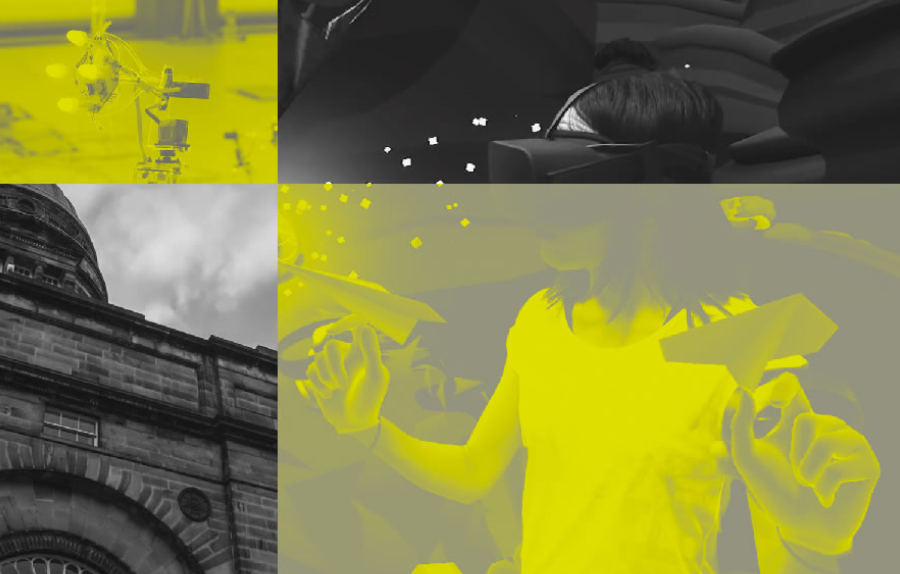Large challenge led competitions are an increasing feature of the research funding landscape. This brings its own challenges in terms of the application process. Success requires a strong partnership between academic and professional services staff. In this blog, Anne Sofie Laegran explains the 2 years+ of intelligence gathering and 12 months of hard work that led to the £10m Creative Informatics Research and Development Partnership, directed by Professor Chris Speed.
In unknown (and unprecedented) territory
The opportunity to apply for millions for research and knowledge exchange in the Arts is rare. So in the spring of 2016, when the CEO of AHRC visited the university and confirmed they were scoping a new Creative Economy programme, we started to prepare, without really knowing what for.
AHRC started consultations with creative industries in autumn 2016 to identify the needs. At Edinburgh the then ECA Director of Research, Ed Hollis, was asked to convene a group of colleagues, with the support of the KE and Impact team of the Research Support Office (RSO). What was on the table was a £16m programme. However, with the UK Government highlighting creative industries in their Industry Strategy Green Paper in January 2017, following the launch of a new Industrial Strategy Challenge Fund (ISCF) in autumn 2016, speculations started emerging as to whether something bigger may be brewing.
AHRC appointed a Creative Economy Champion, Andrew Chitty, and announced he would be travelling around the country to gather views. We were quick to send an invitation and hosted a visit in April 2017. This was just before the unexpected snap election, so the purdah limited what he could say. But it did not stop him being impressed with what he saw: an interdisciplinary environment bringing together creative arts, design and informatics; great connections with industry and cultural partners, the forthcoming Edinburgh Futures Institute and the potential City-Region Deal investment. We were confident we had something unique to offer.
By the time the call was launched in the summer 2017, this had become a £80m programme to support 8 Research & Development (R&D) partnerships for creative industries clusters across the country. £40m of this was actual cash from AHRC through ISCF; the remaining had to be matched by partners.
Building a team
Director of the Centre for Design Informatics, Chris Speed was appointed as the obvious Principal Investigator for our bid, and he put together an interdisciplinary team of Co-Investigators from the University of Edinburgh. Edinburgh Napier University was the obvious academic partner, as were core industry partners CodeBase, the fastest growing tech incubator in Europe, and Creative Edinburgh who bring together a network of 4000 creative practitioners across the city. The proposition was to grow the Edinburgh creative industries cluster through data driven innovation.
A series of workshops and meetings followed, and Festivals Edinburgh, the main large cultural institutions, and a range of tech and creative companies joined as partners. Based on the discussions our bid was to focus on four challenges:
How can data driven innovation:
- help unlock value from archives and collections?
- create new modalities of experience?
- develop new audiences and markets? and
- reveal new business models for the creative industries?
To support the bid we put together a dedicated team from RSO along with colleagues in CAHSS, ECA and Informatics. We met with the academics weekly and helped develop the programmes, budgets and management structures in partnership, contributed to and reviewed numerous drafts and managed stakeholder relations internally and externally.
A long journey ending with champagne
AHRC received 75 expressions of interest in October 2017. It was clear that this was an unprecedented investment from AHRC, both in size and nature.
It broke new ground also for us. Research with and for the creative industries, with new products, services and experiences as outputs, and sustainable businesses and jobs as outcomes. An R&D partnership promising to grow industry. This required new models of delivery, which challenged existing structures for management and budgets, requiring the team to think creatively about solutions. We were in a good position given the alignment with the City-Region Deal aims. Other institutions struggled, so by the time of the first deadline in December 2017, half of those who expressed interest had fallen away.
In February 2018, we heard we were through to the next round, and joined a bidders’ conference in London with 20 other competing teams. We got feedback on our proposal along with a new set of guidance, requiring us to produce 36 pages of new text by the start of April. Content is king, but presentation also crucial, so we hired a designer and even bought a special font, which made the proposal stand out. Time and money well spent, as in May we were through to the final 12 invited for interviews. We set up two mock panels to rehearse, so the five co-directors knew their pitch when they went to Swindon.
The news came 18 July 2018; we had won! Champagne corks popped across Europe as most of the team were on holiday. There was no resting on laurels when we came back though! With a required start date of October there was a lot of hard work ahead. This included hiring five postdoctoral research associates and five professional services staff. 14 December was the launch party at CodeBase, and the full team was in place by the start of 2019. After some separation angst, the colleagues supporting the application are onto new projects, proud to have helped enable 54 months of exciting R&D to help grow the Edinburgh creative industries.
For information about Creative Informatics see:
https://creativeinformatics.org
Twitter @CreateInf
https://www.facebook.com/CreateInf/
Anne Sofie Laegran is Head of Knowledge Exchange and Impact in the Research Support Office.



